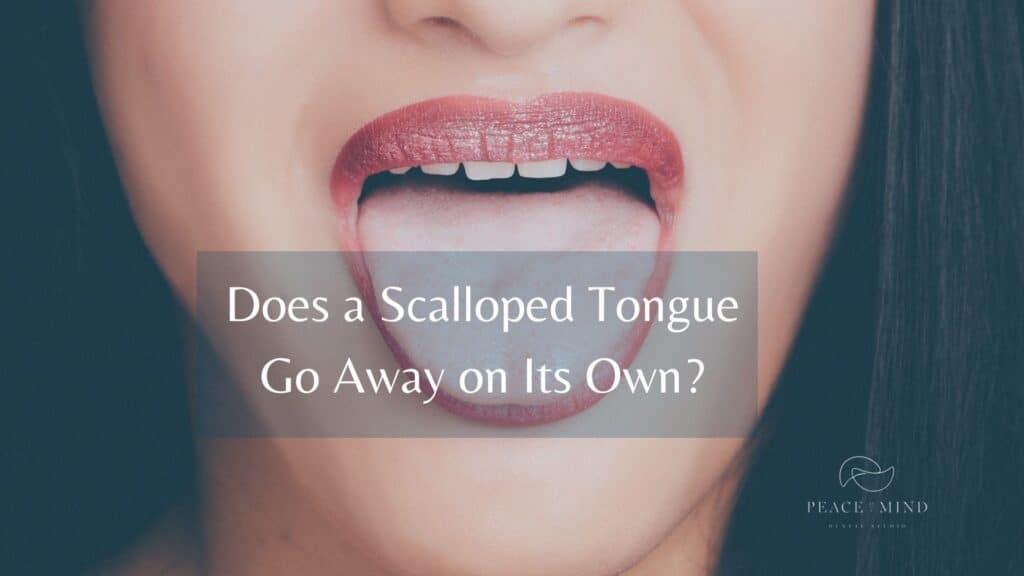
Have you recently noticed unusual ripples or waves along the edges of your tongue? You might be dealing with a scalloped tongue.
Do not worry; a scalloped tongue is not a cause for concern. However, it can be a symptom of another underlying issue requiring an immediate appointment with your dentist.
If you’re wondering, “Does a scalloped tongue go away on its own?” or “What does a scalloped tongue indicate?”—this blog has all the answers you need. And if you are experiencing a scalloped tongue, we recommend you book an appointment with us immediately.
What Is a Scalloped Tongue?
A scalloped tongue has indentations, wavy edges, or ripples along your tongue’s length. They look like the teeth’s impressions. Usually, they are not painful and do not indicate color changes or soreness, but they can cause discomfort, swelling, or dryness.
It’s important to understand that this condition is typically a secondary symptom, meaning it’s often a sign of another issue rather than a disease.
What Does Scalloped Tongue Mean?
You might be wondering, “What does scalloped tongue mean?” It often points to pressure or irritation when the tongue presses against the teeth. This can happen over time due to swelling, inflammation, or abnormal tongue posture.
A scalloped tongue might be an indication of:
- Enlargement of the tongue
- Dehydration or dry mouth
- Sleep apnea or airway restriction
- Bruxism (teeth grinding)
- Nutritional deficiencies
- Stress or anxiety
Scalloped Tongue Causes
Here are the common causes of a scalloped tongue:
Swollen or Enlarged Tongue (Macroglossia)
When the tongue becomes larger than usual, it presses against the teeth and develops a scalloped edge. This swelling can result from allergic reactions, infections, or underlying medical conditions like hypothyroidism or amyloidosis.
Bruxism or Teeth Grinding
If you clench or grind your teeth at night, especially due to stress or sleep disorders, your tongue might get pressed against your teeth, leaving indentations.
Obstructive Sleep Apnea
In sleep apnea, your tongue takes on abnormal postures, which causes ripples along the edges. If you don’t have any other symptoms, then a scalloped tongue indicates that you might have sleep apnea.
Dehydration or Dry Mouth
A scalloped tongue might be a side effect of dry mouth. Lack of moisture causes the tongue to enlarge or lose its normal texture, thus pressing against the teeth and resulting in indentations.
Nutritional Deficiencies
Low levels of vitamins like B12, iron, or folic acid affect tongue health. These deficiencies cause swelling, discomfort, and scalloping.
Anxiety and Stress
Anxiety and stress cause you to clench your teeth and press your tongue abnormally, resulting in waves along the length.
Does A Scalloped Tongue Go Away On Its Own?
A scalloped tongue often disappears if the underlying cause is treated, such as a sleep disorder or apnea. However, the scalloping may persist or worsen if left unaddressed, depending on the root cause.
Here are specific examples wherein the tongue turns to its normal shape:
- If dehydration is the cause, increased fluid intake and oral hydration may help it go away.
- If bruxism is the culprit, wearing a mouthguard will help.
- More targeted treatments will be needed if the issue stems from sleep apnea or another medical condition.
What Are Scalloped Tongue Treatment Options?
Scalloped tongue treatment starts with a dental examination to locate the underlying cause. Based on the diagnosis, the following approaches are used:
Dental Appliances: Custom nightguards reduce pressure from grinding or clenching.
Stress Management: Techniques like mindfulness, therapy, or relaxation exercises help reduce unconscious tongue pressure caused by stress.
Treatment for Dry Mouth: Hydration is the obvious treatment. You can also rely on special mouthwashes or lozenges to keep your mouth moist and reduce tongue swelling.
Nutritional Support: A blood test is prescribed to learn about dietary deficiencies that you might have.
Medical Treatment for Sleep Apnea: If we suspect sleep apnea in our examination, you may be referred for a sleep study. Treating it with a CPAP machine or oral appliance can improve tongue posture and reduce scalloping.
When Should You See a Dentist?
You should schedule an appointment at Peace of Mind Dental Studio if:
- Your scalloped tongue lasts more than a few weeks
- You are experiencing pain or discomfort
- You have dry mouth symptoms
- You are unsure of the cause
We are here to help identify the root cause and prescribe the most suitable treatment.
Book an appointment now!
Why Choose Peace of Mind Dental Studio for Scalloped Tongue Treatment?
A scalloped tongue is not harmful, but it shouldn’t be ignored. As discussed above, it can be an indicator of multiple health issues. Thus, you need an expert to help you determine the underlying cause of the scalloped tongue and prescribe suitable treatment.
At Peace of Mind Dental Studio, we recognize the strong connection between oral health and overall well-being. While a scalloped tongue may seem like a minor issue to some, we understand the discomfort it can cause, whether from swelling or dry mouth. Our caring team is dedicated to prioritizing your health, addressing the scalloped tongue, and resolving its root cause with compassion and expertise.
Book an appointment with us to get the best dental treatment.


